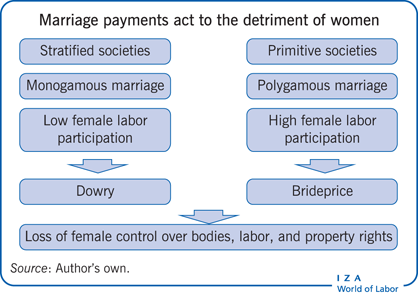Elevator pitch
Payments at the time of marriage, which are ubiquitous in developing countries, can be substantial enough to impoverish parents. Brideprice and dowry have both been linked to domestic violence against women, and inflation in these payments has prompted legislation against them in several jurisdictions. Marriage payments are often a substitute for investment in female human capital, so from a welfare and policy perspective, they should be prohibited. This highlights the importance of promoting direct economic returns over legal and customary rights.

Key findings
Pros
Dowry can lead to higher bargaining power for women.
Dowry can lead to higher male human capital investment.
Brideprices value the productivity of females.
Dowry can increase female rights to inheritance.
Marriage payments transfer wealth to the next generation.
Cons
Dowry and brideprice are associated with domestic violence against women.
Dowry payments force parents to disinvest in female human capital.
Brideprices hinder the bargaining power of women.
Marriage payments are large enough to impoverish parents.
Initial processes of development inevitably cause marriage payments to evolve to the detriment of women.